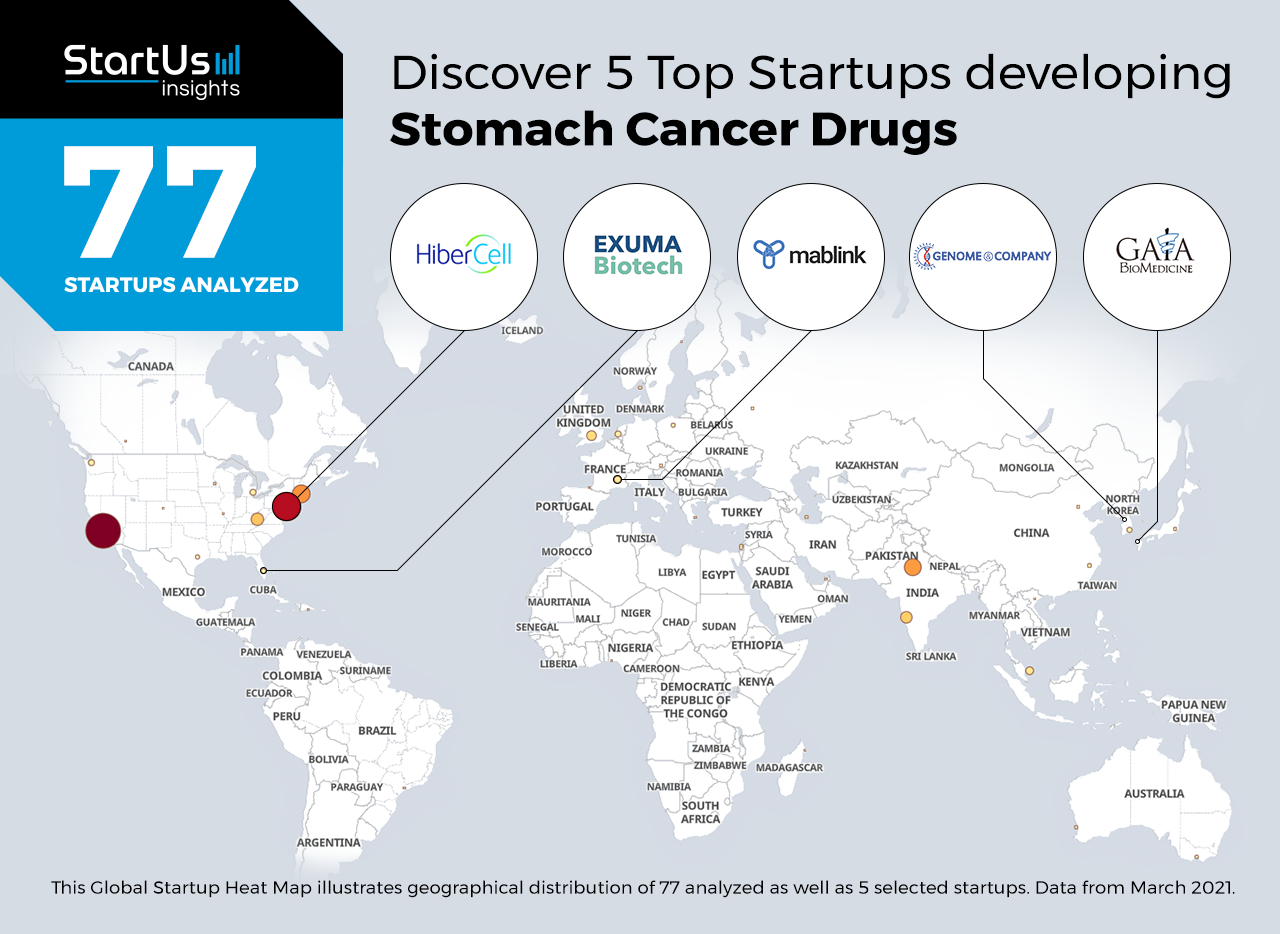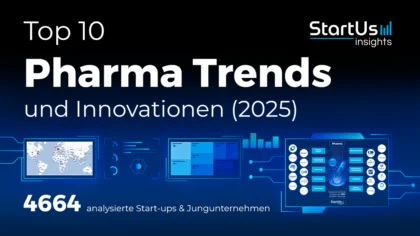Staying ahead of the technology curve means strengthening your competitive advantage. That is why we give you data-driven innovation insights into the pharma industry. This time, you get to discover 5 hand-picked startups developing stomach cancer drugs.
Global Startup Heat Map highlights 5 Top Startups developing Stomach Cancer Drugs out of 77
The insights of this data-driven analysis are derived from the Big Data & Artificial Intelligence-powered StartUs Insights Discovery Platform, covering 1.379.000+ startups & scaleups globally. The platform gives you an exhaustive overview of emerging technologies & relevant startups within a specific field in just a few clicks.
The Global Startup Heat Map below reveals the distribution of the 77 exemplary startups & scaleups we analyzed for this research. Further, it highlights 5 startups developing stomach cancer drugs that we hand-picked based on criteria such as founding year, location, funding raised, and more. You get to explore the solutions of these 5 startups & scaleups in this report. For insights on the other 72 startups developing stomach cancer drugs, get in touch.
HiberCell develops Kinase Inhibitors
Cancers spread to other parts of the body through metastasis, often leading to relapse after successful treatment, at the site of origin. These metastasized cells persist in the body because of a favoring tumor microenvironment and adaptive stresses. Pharma startups are developing new drugs that inhibit these two factors for the treatment of metastatic cancers. This improves patient outcomes by reducing the risk of cancer recurrence.
HiberCell is a US-based startup developing first-in-class therapeutics for dormant tumor cells. The startup is working on protein kinase R–like endoplasmic reticulum kinase (PERK) inhibitors as adaptive stress modulators. It is developing a PERK inhibitor for the treatment of gastric cancer and testing it both in monotherapy and in combination with other drugs. The startup’s pipeline also includes tumor microenvironment modulators for the treatment of stage III melanoma and metastatic breast cancer.
Mablink Biosciences builds Antibody-Drug Conjugates (ADCs)
Patients undergoing chemotherapy often experience side effects such as hair loss, diarrhea, and nausea. To address this, pharma companies and startups are innovating with new drugs that provide higher specificity. ADCs, one such solution, represents a new class of biologics that link an anticancer drug with an antibody. The antibody part helps to deliver the drug precisely in tumor cells, minimizing side effects.
French startup Mablink Bioscience builds next-generation antibody-drug conjugates. The startup’s PSARlink platform creates hydrophilic drug linkers that are adaptable to various types of linker architectures and drug compounds. The technology works with both unmodified monoclonal antibodies and re-engineered antibodies. The startup’s MBK-102 drug is in preclinical development for the target of multiple myeloma and has shown promise for gastric cancer.
EXUMA Biotech provides Chimeric Antigen Receptor (CAR)-T Cell Therapy
The CAR-modified T-cells are engineerable to target any tumor-associated antigen. As a result, pharma startups and companies have turned their attention to CAR-T cell therapy for the treatment of various cancers in recent years. However, their use has not shown success in solid tumors. Pharma startups are working on innovations to adapt CAR-T cell therapy for the treatment of solid tumors such as lymphomas, sarcomas, and carcinomas.
US-based startup EXUMA Biotech is developing CAR-T cell therapies for cancer treatment. The startup uses a logic-gate technology that requires both a target antigen and tumor microenvironment to work. This then reduces the risk of on-target, off-tumor toxicity associated with the treatment of solid tumors with CAR-T therapy. The startup’s logic-gate therapies target stomach, ovarian, and breast cancers.
GAIA Biomedicine offers Allogeneic Cell Therapy
With developments in gene editing and gene delivery techniques, cell therapy is on the rise. However, cellular immunotherapies demonstrate insufficient therapeutic efficacy. To this end, pharma startups develop scalable and effective therapies for cancers, including stomach cancer. Allogeneic cell therapies use cells from a single donor to develop off-the-shelf therapies for multiple patients.
GAIA Biomedicine is a Japanese startup offering allogeneic cell therapy. The startup develops natural killer (NK)-like cells that express multiple chemokine receptors and adhesion molecules. These molecules help NK-lice cells accumulate in and fight solid tumors. GAIA-102, the startup’s lead candidate, targets gastric cancer, as well as non-small-cell lung carcinoma (NSCLC) and neuroblastoma.
Genome & Company provides Pharmabiotics
In recent years, there has been significant research demonstrating the connection between the microbiome and health. Pharma startups are leveraging this information to develop living microbes as drugs or pharmabiotics. Unlike probiotics that also use live microbes, these are validated via clinical trials just like any other drug. Anti-cancer pharmabiotics impact cancer initiation and progression, as well as improve the outcome of immunotherapy.
South Korean startup Genome & Company provides personalized immuno-oncology therapies. The startup’s GNOCLE platform mines microbes using metagenomics and metabolomics data to develop them as pharmabiotics. GEN-001, the startup’s lead candidate, is an oral microbiome therapeutic with immune-modulating properties. It is undergoing preclinical trials for the treatment of carcinomas such as gastric cancer.
Discover more Pharma Startups
Startups developing stomach cancer drugs, such as the examples highlighted in this report, focus on cell therapies, as well as inhibitors and modulators. While all of these technologies play a major role in advancing pharmaceuticals, they only represent the tip of the iceberg. To explore more drug development technologies, simply get in touch to let us look into your areas of interest. For a more general overview, you can download our free Pharma Innovation Report to save your time and improve strategic decision-making.










